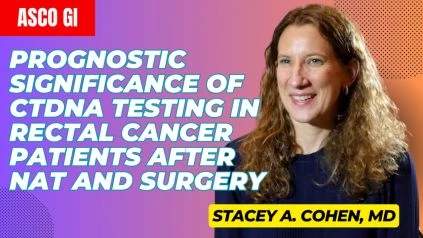OncologyTube: Okay, we’re here at ASCO GI 2024. We have Dr Stacy Cohen, medical doctor and an associate professor of clinical research division at Fred Hutch Cancer Center and University of Washington in Seattle. Dr Cohen, thank you so much for joining us today. Thank you for having me. All right, today we’ll be discussing prognostic value of circulating tumor DNA testing in patients with rectal cancer after neoadjuvant therapy and surgery.
Um, a, uh, presentation released here at ASCO GI 2024. So, Dr. Cohen, could you provide a summary of the research on the prognostic implications of, uh, CT DNA testing in rectal cancer patients following neoadjuvant therapy and
Stacey Cohen, MD: surgery? Yeah, thanks. This is a really exciting topic. You know, thus far we have done observational studies and some perspective studies in colon cancer, but the data in rectal cancer has been far [00:01:00] more limited.
So this is a pretty exciting study of over 250 rectal cancer patients of all stages. The vast majority had stage 2 and 3 cancer, and we followed whether they had neoadjuvant chemotherapy, whether they had surgery or non operative management. and what their survival outcomes were like and looked at how ctDNA may be a prognostic risk factor.
And it was really quite interesting, similar to colon cancer, we saw that being positive after surgery occurred about 14 percent of the time. And those patients had worse. disease free survival, but really the novel data looks at the patients who did not have surgery and patients who elected non operative management but still were ctDNA positive had worse outcomes as compared to patients who were ctDNA negative.
Fantastic.
OncologyTube: Given the strong association between post NAT CT DNA status and clinical responses, how could the integration of CT DNA testing impact the decision [00:02:00] making process for perioperative treatment in rectal cancer patients?
Stacey Cohen, MD: So right now when we consider a patient for non operative management, we try to use all the diagnostic tools at our fingertips.
We look at a CT, we look at an MRI. and we’ll do endoscopy to evaluate if someone has residual cancer. This really could add a fourth dimension, which is ctDNA, to say that if someone is, has no radiographic evidence of disease, they have no luminal evidence of disease, and they are ctDNA negative, Maybe that is the ideal patient to end up getting non operative management.
Or maybe we need to revise our patient selection in some other way. So I think it really adds another avenue that we can start to look at to try and carefully select which patients we’re going to forgo surgery.
OncologyTube: Excellent. What are the key considerations for conducting further studies to assess the feasibility and effectiveness of ctDNA guided management in both post NAT and [00:03:00] non operative management settings for rectal cancer patients?
Stacey Cohen, MD: You know, this is an observational study of real world data. So we really haven’t yet controlled for a lot of the clinical factors and variability. Patients could have had a variety of different total neoadjuvant therapy regimens or simply have chemo radiation. So I think what this suggests is that this is an interesting avenue that we need to start incorporating into standard clinical trials.
And thankfully some of those trials are already underway where we really can start to see is. If ctDNA could be the next, uh, best biomarker for us to help select patients.
OncologyTube: So I skipped over one, so I’m going to, I’m going to squeeze it in here. Can you discuss the potential clinical implications of the observation that MRD positive patients had significantly worse DFS compared to MRD negative patients, particularly in terms of tailoring follow up and adjuvant therapy strategies?
Stacey Cohen, MD: It’s a really tricky question in colon [00:04:00] cancer. As I said, we similarly see about 14 percent of patients are positive for C. T. D. N. A. After surgery, but in colon cancer, they typically would not have been exposed to prior chemotherapy. And so because of that, you have the opportunity of hopefully influencing their their outcomes and trying to clear that ctDNA through adjuvant chemotherapy.
In rectal cancer patients may have had neoadjuvant chemotherapy or chemoradiation, so you can imagine that in the adjuvant setting they might be less sensitive to using some of those standard regimens. So I think we need to look at the data a little bit more and this is underway about whether patients who had neoadjuvant chemotherapy are those the same ones that We’re later positive for ctDNA after surgery.
So that’s one thing that we can look at with this data set in the future, though, I think it’ll be helpful to say, maybe we need to give those patients a different chemotherapy regimen such as full fury or some other targeted therapy. If they are still ctDNA positive after [00:05:00] chemotherapy in the new adjuvant setting, chemo radiation and surgery.
OncologyTube: Alright, so this was Dr. Stacey Cohen, medical doctor and associate professor of clinical research division at Fred Hutch Cancer Center and the University of Washington in Seattle. Thank you so much for joining us today. Thank you.

